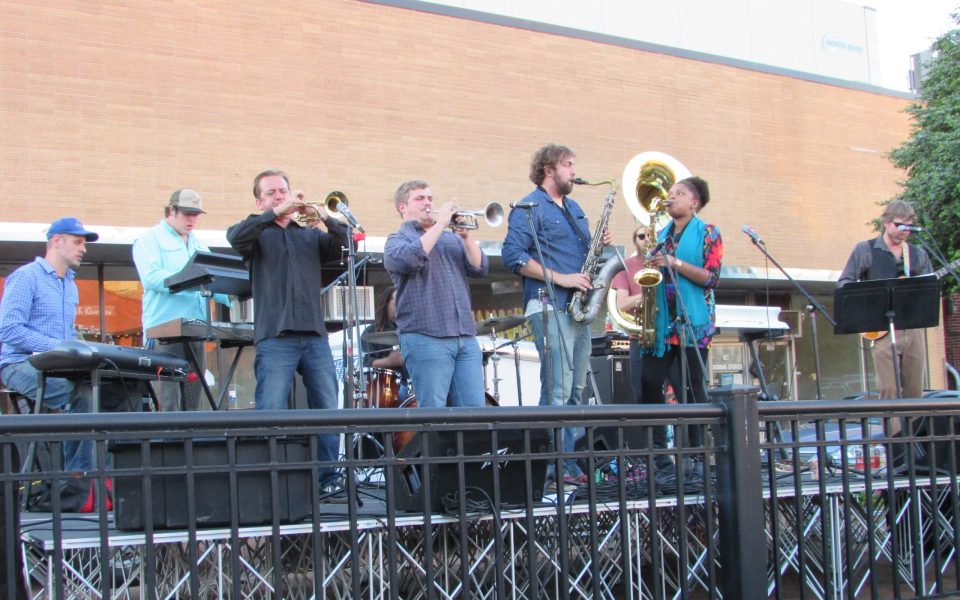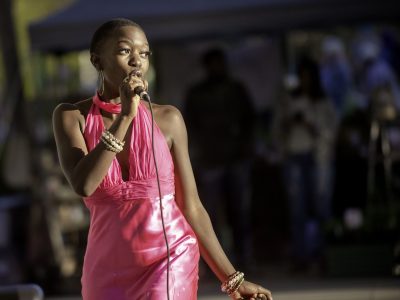by Jordan Green
The members of Empire Strikes Brass picked up their horns, struck up a second line and marched out the alley that runs along the railroad track at the Depot in downtown High Point around 7 p.m. on May 22. They rounded Main Street, and then looped back on High Avenue before crossing the walk bridge across the track and taking up position on the improvised bandstand where they had started.
It was a fitting launch for the Ignite High Point Whistle Stop Concert Series, conceived and commissioned by City Project to inject vitality into downtown and build social capital.
“We always try to start our shows by marching in, in a second line,” said Paul Juhl, one of the saxophonists of the Asheville-based brass band, said, “whether it’s legal or not.”
Street gatherings after dark are so rare in a downtown where the biannual furniture market has priced out retail, restaurants and bars that it seemed like it should be illegal, whether it actually was or not. Free outdoor concerts are by no means unprecedented in High Point — Party on the Plank organized by Elijah Lovejoy from 2010 through 2012 was a similar effort — but the five-week Whistle Stop Concert Series follows a more highly curated format. Produced by Durham-based Sonic Pie Productions, the series showcases high-caliber regional acts, with two bookings that seem intentionally geared to appeal to Latino and African-American audiences respectively.
The ecumenical Empire Strikes Brass set a unifying tone on May 22. The alt-country group the Black Lillies is booked for Friday. Batuque de Terreiro with Dance Gabriella brings a Brazilian dance party to the Depot on June 5. Durham funk ambassadors the Chit Nasty Band show up on June 12. And Holy Ghost Tent Revival, a roots-rock band with foundational elements of ragtime, rounds out the series on June 19.
By 7:20 p.m. on May 22, the prime real estate on the upper deck of the train station — the portion shaded by the North State Communications building — had been claimed by seasoned couples in beach chairs, young families with strollers and couples leaning against the railing. The high-spirited brass band, anchored by JP Purness on sousaphone, with double-trouble reinforcements on saxophones and trumpets, and a funk-stew of drums guitar, keyboards and synthesizer extending the jam, held the audience in thrall, even across the chasm of the recessed railroad track.
“They told us they had an acoustic challenge for us — to play across a railroad track,” Juhl recalled. “And we said, ‘Yes, that will be a challenge.’”
The horns carried above the occasional freight train blasting past, just below the audience’s site lines. The inaugural night did not quite deliver on the promise of craft beer and food trucks. Sweetwater Brewing Co. rationed out through a scrip system was the extent of craft beer, and the Dawg Zone from Apex corralled food sales. Volunteer David Rosen pledged that by the next installment, the food trucks would be in place, but no one seemed to be complaining; the Chicago-style hotdog garnered rave reviews.
New Orleans funk is a starting point for the brass band, their rolling, simmering boil of the Neville Brothers’ “Hey Pocky Way” during the first set being Exhibit A.
Culling the best talent in Asheville, Juhl assembled a group of players who can play basically any material and shift with ease across genres. Their horn rendition of electronica artists RJD2’s “Ghostwriter” was spot-on, and completed a circle. Where RJD2 deployed electronic programming to capture a gospel feel, Empire Strikes Brass used the same instruments that Buddy Bolden and his band played a century ago to put their own stamp on the RJD2’s inescapably delicious melody. The result cycles back to something like King Curtis early ’70s instrumental soul work.
Progressing through its second set, Empire Strikes Brass went deeper into euphoric New Orleans funk, with renditions of Professor Longhair’s “Big Chief” and Rebirth Brass Band’s “Do Whatcha Wanna.” Following the drum break in “Big Chief” Paul Juhl and Debrissa McKinney’s saxophones playfully taunted each other, while the trumpeters blew sweetly.
The brass band’s smartly chosen, performed with syncopated fire, only glanced at guitar-based, rock-and-roll conventions, none more so than when Purness switched from sousaphone to bass for a smoking rendition of Little Feat’s “Spanish Moon,” followed by War’s righteous “Slippin’ Into Darkness.”
When the band announced its last song, some in the audience folded up their chairs and cleared the premises to beat the traffic, while others kept dancing through the final syncopated denouement, and lingered afterwards to enjoy the waning light of day.
Join the First Amendment Society, a membership that goes directly to funding TCB‘s newsroom.
We believe that reporting can save the world.
The TCB First Amendment Society recognizes the vital role of a free, unfettered press with a bundling of local experiences designed to build community, and unique engagements with our newsroom that will help you understand, and shape, local journalism’s critical role in uplifting the people in our cities.
All revenue goes directly into the newsroom as reporters’ salaries and freelance commissions.





Leave a Reply